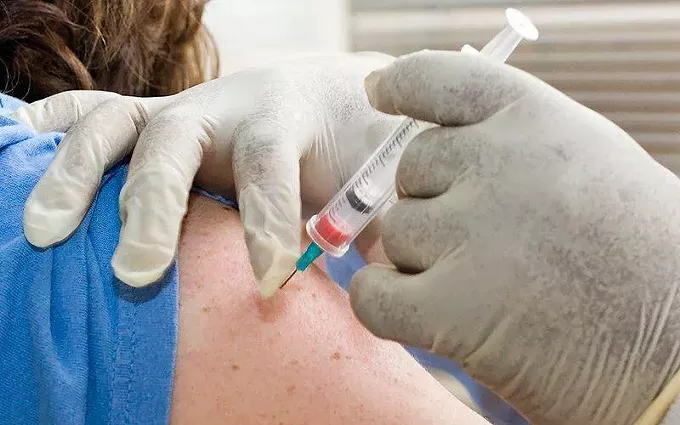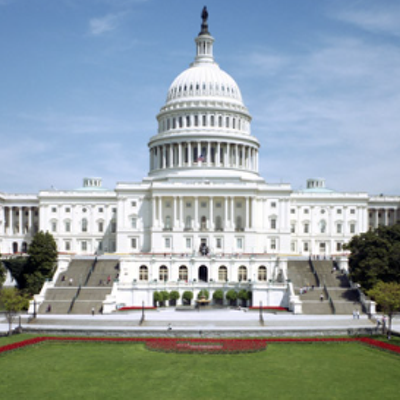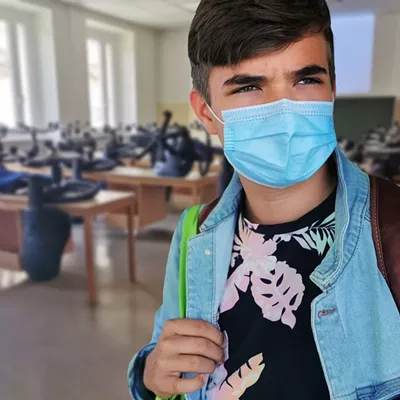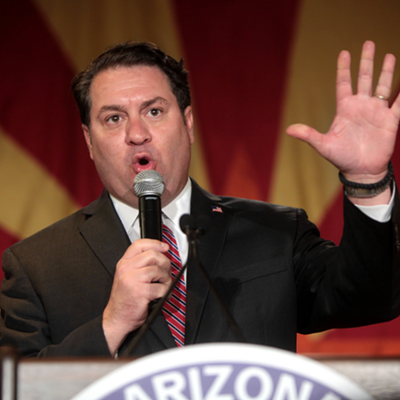Late last week, Gov. Doug Ducey reluctantly gave permission for Pima County to work with FEMA to set up vaccination centers in minority and low-income neighborhoods.
Why Ducey decided to pick this particular fight remains a mystery. In an effort to get more minority and poor people vaccinated, FEMA has been working with some local authorities to set up vaccination centers with a dedicated supply of doses. Pima County happens to be transitioning to indoor vaccination clinics (as efficient as the drive-thru mass vax sites are, you can't expect your staff to stand out in triple-degree digits for nine hours as cars roll by) at the Kino Event Center and El Pueblo Neighborhood Center. So it seemed a perfect fit that would help roughly 210,000 more Pima County residents get vaccinated.
But after FEMA ran it by Arizona Health Director Dr. Cara Christ, she shot down the idea. Asked about it by KGUN News reporter Valerie Cavazos, Christ said the state didn't have the resources to help out.
That led to a letter from FEMA Acting Regional Administrator Tammy L. Littrell, who diplomatically called bullshit on Christ's comments to the press:
"I am concerned that our conversations earlier this week did not include the reservations outlined yesterday when communicating with the press, so I want to address those in this letter."
Littrell assured Christ that the FEMA site would not impact Arizona's current allocation of vaccine; that the federal government was willing to work with the state on establishing the site; and that people would not have to wait four or five hours to get their vaccine.
The county released that letter on Wednesday, March 24, just as Ducey came down to Tucson to get his second shot and take a victory lap. But he was visibly irritated that the local press, rather than celebrated his efforts to put vaccines in arms, kept asking him why he was stopping Pima County from getting vaccines into arms. Faced with questions about why he didn't want to participate in a FEMA program that would cost the state nothing and vaccinate hundreds of thousands of people, Ducey continued to argue that all the vaccine should be his to dole as he pleases.
Perhaps realizing how imperious that argument sounded, Christ threw in the towel two days later. Ahead of her Friday press conference, Christ replied to Littrell's letter with a mix of surrender and petty grievances, arguing that Pima County had been so outrageous as to ask the state to a portion of the $400 million it received from the feds for COVID testing.
In a response letter, Pima County Administrator Chuck Huckelberry thanked Christ for reconsidering the opposition to a FEMA vaccination site in Pima County.
Huckelberry also sought to "correct one misunderstanding," saying the county had the ability to financially support the vaccination center with FEMA.
Huckelberry also said the county "had simply asked for a reasonable share of the federal allocation of $416 million to the state for COVID-19 testing."
Huckelberry said the county would continue testing as it remains vital to track the progress of the virus.
"No further assistance from the state will be needed in Pima County in setting up the federal POD," Huckelberry wrote.
We won't be surprised to learn in the weeks to come that the state has cut back on vaccine supplies to Pima County as payback for making a stink about the FEMA clinic.
A few weeks ago, we tossed out a few names of potential candidates for a Southern Arizona congressional seat after Rep. Ann Kirkpatrick said she wouldn't be seeking another term in 2022.
But given that we still don't know the boundaries of the district—the Independent Redistricting Commission is just getting to work because the Trump administration screwed up the Census—it's impossible to say at this point whether the district will lean left, lean right or be competitive.
Nonetheless, we have seen two candidates launch campaigns in recent weeks and will likely see more. There's not much harm in exploring the race—you can put your name out there, see how well you can raise money and then decide later this year if the draft maps of the district look promising.
The first candidate in the race was state Sen. Kirsten Engel of midtown Tucson. A former attorney with the EPA, Engel now teaches at the UA College of Law when she isn't lawmaking.
Following her out the box was state Rep. Randy Friese, a veteran and trauma surgeon who got his start in politics after helping save the life of Gabby Giffords when she was shot along with 18 others on Jan. 8, 2011. Friese is tight with Team Giffords and told the press he had raised more than $100,000 within a week of announcing his plan to run.
But we have heard many names of other ambitious Democrats circulating:
• State Rep. Daniel Hernandez, who was working as an intern for Giffords during that 2011 shooting, was credited with saving her life when he kept pressure on the gunshot wound until first responders arrived on the scene. Hernandez now serves in the Arizona House of Representatives alongside his sister, Alma, while his other sister, Consuelo, serves on the Sunnyside School Board. We have a hope that all three Hernandez siblings will get into the race and go after each other with hit pieces focused on their behavior in grade school.
• State Rep. Andres Cano, a former aide to Pima County Supervisor Richard Elias who won office in 2018.
• Pima County Supervisor Matt Heinz has taken a few unsuccessful runs at Congress in the past, but he just won his seat on the Board of Supervisors in 2020. Still, the perch gives him a good opportunity to build name ID as he ponders a run.
• Tucson Mayor Regina Romero recently took herself out of consideration for a job with the Biden administration, which allows her to consider running for Congress from her perch atop City Hall.
• Attorney Michael Crawford, who served a couple of terms on the Tucson City Council back in the mid-'90s, is feeling some fire in his belly these days. Crawford had considered running for the open Ward 3 seat on the Tucson City Council this year, but when Kirkpatrick announced her retirement, Crawford said he "took it as a sign" that he was meant for bigger things. A part owner of the Prime Leaf Dispensary, Crawford says his campaign slogan will be: "Pot for Potholes!"
On the GOP side, there are a number of names as well, including:
• Lea Marquez Peterson, who ran unsuccessfully for Congress in 2018 before being appointed to the Arizona Corporation Commission, did not close the door on a race during an appearance on Bill Buckmaster's radio show last week.
• State Sen. David Gowan, who abandoned his 2016 run for Congress amid a scandal involving his use of a state car for campaigning while claiming around $10,000 for mileage and other expenses, is mulling a campaign.
• Shay Stautz, a former lobbyist for the UA who dropped out of his 2020 campaign for Congress after his signatures were challenged, could be considering another run this year.
There's less than a week until signatures are due for candidates for Tucson City Council this year—assuming we have having an election this year. (The Arizona Supreme Court is still weighing whether state lawmakers can force Tucson to move its election cycle to the presidential/midterm years instead of the current system of odd-numbered years.)
Looks like the Pima County Republican Party does not have any candidates willing to seek a seat on the all-Democratic City Council. As of Tuesday, March 30, no Republicans had pulled paperwork for the race.
But in Ward 3, where Democrat Paul Durham stepped down and appointed Councilwoman Karin Uhlich has said she would not seek the office, we are still seeing an Aug. 3 primary battle shape up between environmentalist Kevin Dahl and entrepreneur Juan Padres. Independent candidate Lucy Libosha hopes to face the primary winner in November.
In Ward 6, three-term Councilman Steve Kozachik has already filed his nominating petitions with more than 750 signatures and announced that he would not accept campaign funds in his bid for reelection this year. He said it would be better to give money to a local nonprofit or business.
"People are working hard to get back on their feet as we hopefully see an off-ramp to COVID-19," Kozachik said. "If you have extra cash to invest in a cause, please consider supporting our local businesses, or find a non-profit that is aligned with your beliefs. People want money out of politics. That's what my campaign will model once again."
Two Democrats have launched campaigns to knock Kozachik out of the Ward 6 seat he's held since 2009, when he was first elected on the Republican ticket. After a number of political skirmishes with Republican state lawmakers, Kozachik switched to the Democratic Party before running for a second term.
Democrat Miranda Schubert, a UA academic advisor and radio host at community radio station KXCI, has said she will focus her campaign on housing affordability and police reform.
Democrat Andrés Portela, who formerly worked as a policy and community development director for Kozachik's colleague, Ward 1 Councilmember Lane Santa Cruz, has said he is running "as a progressive Democrat with an emphasis on H.O.M.E. Housing, Opportunity, Mobility Justice and Environmental Justice."
Independent candidate Val Romero hopes to face the winner of the Ward 6 primary in the November primary race.
Finally, Ward 5 Councilman Richard Fimbres has yet to draw a challenge from a Democrat or a Republican, but independent candidate Lucas Rodriquez is gathering signatures for a spot on the November ballot.








